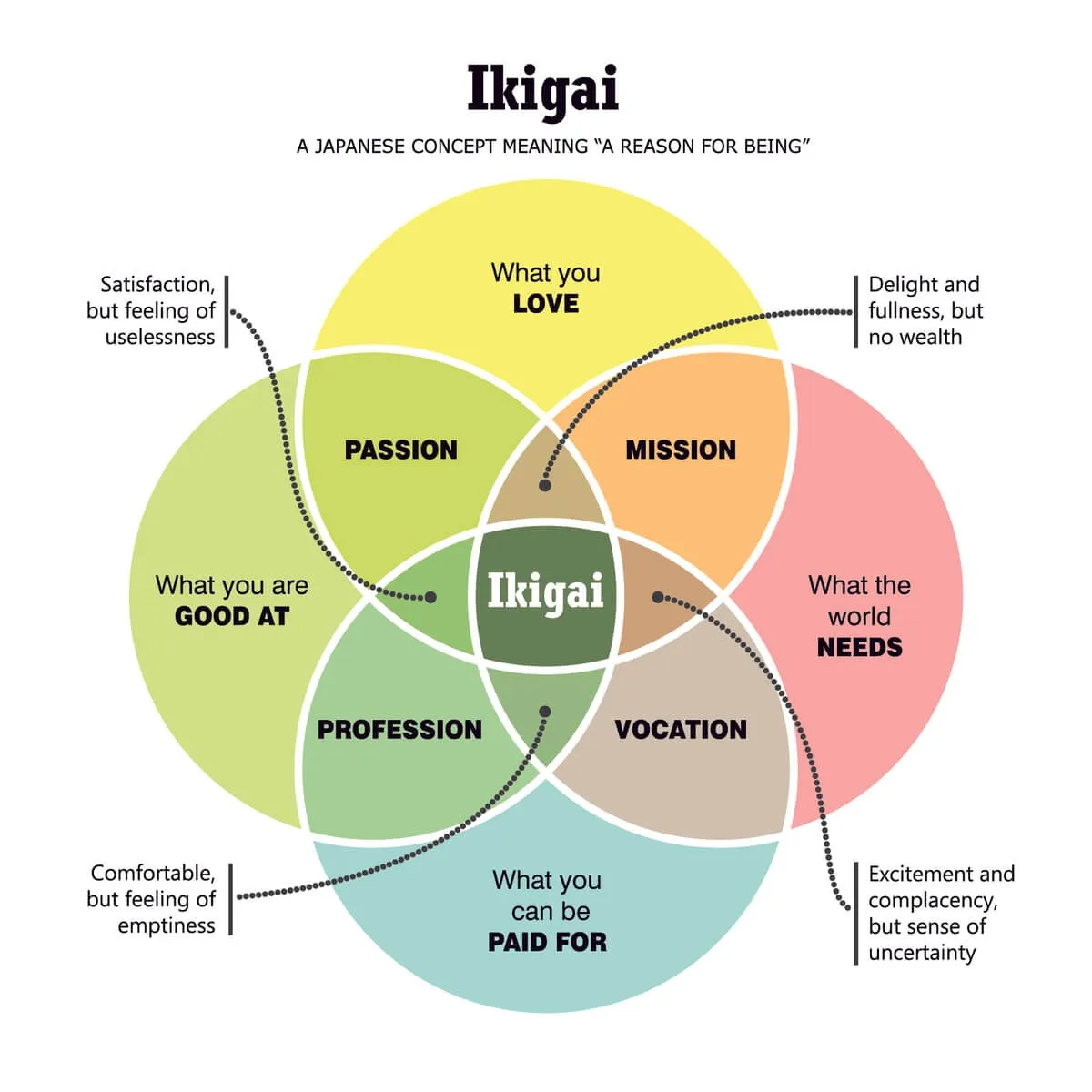Introduction
Japan has among of the world's longest-lived inhabitants, with women surviving an average of 87 years and males living an average of 81 years. Okinawa, a small island off the coast of Japan, has an unusually high number of centenarians. While the people's lifespan is likely due to their specific diet, Dan Buettner, author of the book "Blue Zones: Lessons on Living Longer from the People Who’ve Lived the Longest" believes that the Japanese concept ikigai also plays a role.
What Is Ikigai?
Ikigai is a Japanese term that means in English "cause for being" or to put it simply "the reason why you and I get out of bed every morning". This Japanese philosophy refers to having a direction or purpose in life that gives a person a sense of fulfillment and motivates them to conduct acts that provide them satisfaction and meaning.
In trying to find your happiness, ikigai requires you to answer the following four questions :-
- What do you love doing?
- What are you good at?
- What does the world need?
- What can you be paid for?
The first two questions are internal which relates to your interest, talents and personality. The last two questions are external in nature and they relate to the world around us. Having a good understanding of how the world around us will help us to give better answers.
When what you love doing is also something that you are already good at, you have found your passion. These are your hobbies like cooking and drawing for which you have the talent for and enjoyed doing. You have found your mission if what you love is also what the world needs. An example of this will be Mother Teresa's mission for the poor and needy. If what you good at coincides with what you can be paid for, you have found your profession. A lot of successful professionals are very highly paid. A vocation is when when what the world needs meets what you can be paid for. However a vocation is just a way earning an income, you may not love what you are doing or be highly skilled.
Looking at the diagram above, ikigai is found in the intersection of the 4 of the four circles. When what you love doing is also what you are good at and what the world needs and for which you will be paid, this is your ikigai. Once this happens your internal self is aligned to the your external environment.
Finding Your Ikigai
Many of us have goals and dreams. Some aspire to be successful entrepreneurs, film stars, and the list goes on. We work very hard and make tremendous sacrifices in the hope that when we finally attain our dreams, we will be happy. Although our goals differ, the underlying desire is ultimately to seek happiness.
In order to find your ikigai, focus on these 5 pillars as suggested by Ken Mogi, a neurologist and author of "Awakening Your Ikigai".
Begin small.
The first step is simple to complete. It's all about taking small steps. Achieving a goal takes time and requires taking small steps. So, instead of getting stuck in a big dream, concentrate on the small actions that you can do in the short term. One practical way of doing this is to start a side hustle on a part time basis.Allow yourself to be free.
Accept yourself for who you are. We cannot expect everybody to like us neither is it necessary to impress everyone that we meet. As humans, we all have defects and blemishes. Have you seen the lovely Japanese broken ceramics with gold filling the cracks? We've all been broken once, twice, or several times, yet we're still here. You'll be happier than ever if you let yourself flow and embrace ourselves for who we are. Many times it is our weaknesses and defects that makes us unique and defined who we are.Harmony And Sustainability
The environment in which you live will have an impact on you. You will transform both your environment and yourself by bringing change to your environment. Putting our aims and desires above all else might have harmful consequences. Individual aspirations can be evaluated against the long-term viability of society and the environment in which you live. In Japan, harmony is strongly emphasized and more importance is given to society than to the individual compared to western culture.The Joys Of Little Things
We should strive to find joy in the little things that we encounter daily, although these things may seem insignificant to others. Little things like watching a sunset, sipping tea, watering our plants or walking the dog can bring joy to us. If we are a little bit happier each day, this will result in a lifetime of happiness.Be In The Here And Now
We need to be fully present in order to savour our moment to moment experiences. The problem is that we are constantly fear what the future will bring or worry too much on our past. Remeber that you can only feel happy in the present moment, not in the past or the future. Do not let the fears tomorrow or the worries of yesterday rob you of the joys of today.
Conclusion
If we design our lives around ikigai, we will live happier, more fulfilled and richer lives. We will live in a state of flow, our internal self will be aligned to the external environment.
Hive Common Phrase
Follow me and stay positive.
Do check out my previous posts.
My Trans-Siberian Railway Adventure Part 2: Views From A Train’s Window
BOW:That One Childhood Memory That Lives With Me
My Trans-Siberian Railway Adventure Part 3: Views From A Train’s Window
Seeing The Beauty Around Us And My Poem “Miracle Of A New Day
My Trans-Siberian Railway Adventure Part 4: From Moscow To St Petersburg
Sharing My Experience With Intermittent Fasting
[@positivesteem/the-magnificent-palace-and-estate](The Magnificent Palace And Estate of Versailles)
Spreading positivity one post at a time.
Charles
Look me up at You Tube
Connect with me on Facebook



